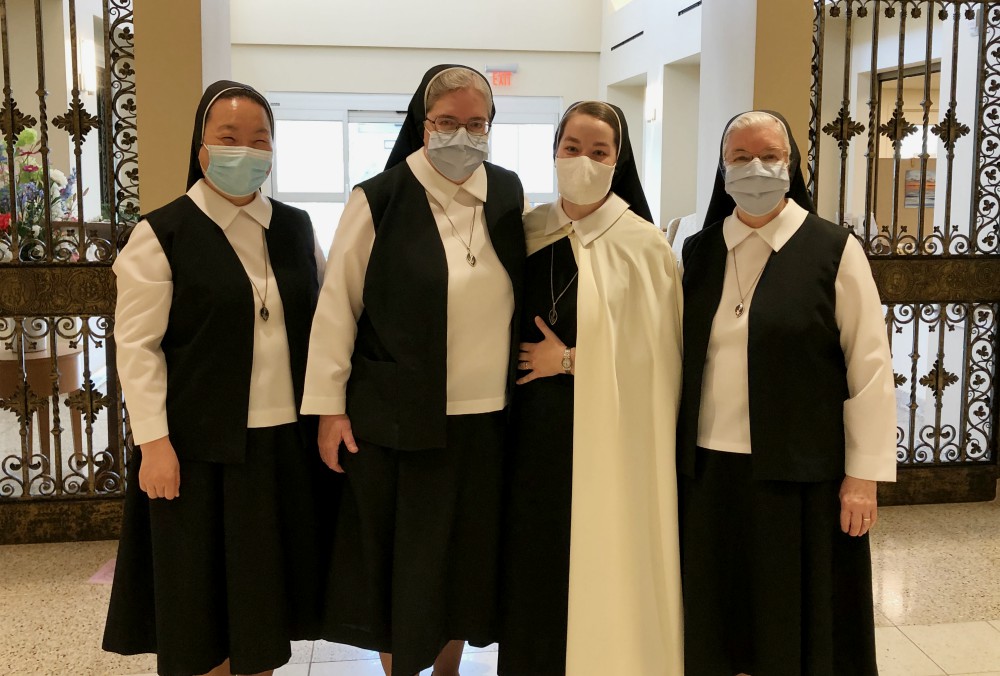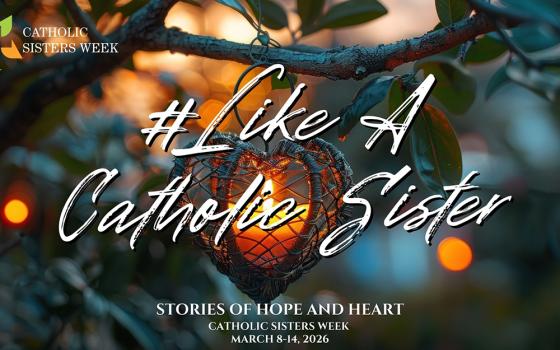
From left, Sisters of Christian Charity Clara, Ann Marie, Mary Amata and Gerardine celebrate the perpetual profession of Sister Mary Amata Aug. 15 in Mendham, New Jersey. (Provided photo)
No strangers to epidemics, religious communities over the centuries have responded to cholera, smallpox, yellow fever, diphtheria, typhoid and influenza. More recently, we responded to the suffering caused by SARS, MERS, Ebola and Zika. Each congregation has its stories of when courageous members risked their lives in the service of God's people during these times.
In my congregation, we tell the stories of our founder, Pauline von Mallinckrodt, who at the age of 17 in Germany cared for her mother who was stricken with typhoid. As a woman religious, von Mallinckrodt cared for neighbors during a cholera epidemic. Many other such stories can be told of sisters throughout our history.
I wonder what stories will be told about this time in our history. Years from now, what will be said of the response of the sisters in 2020, who were faced with the novel coronavirus — with the disease of COVID-19?
I'm sure some of the stories will include how our educators had to undertake the mammoth task of learning how to teach "virtually." Certainly, we will talk about the responses of our sisters in health care, social services and pastoral ministries. Perhaps we will tell of the efforts of many of our sisters who sewed and distributed hundreds of thousands of facemasks. Maybe we will share how, for a time, every group encounter we had was mediated via Zoom, Skype or FaceTime (which might be obsolete by the time we are retelling our stories).
Should I be granted the grace of old age, I am sure that the stories I tell about my community during this pandemic will include grand acts of service for many of God's people. I will, undoubtedly, also relate my personal stories of serving the sisters in my convent home during this time.
It is my hope that, no matter what stories are told, they will always include a reminder of how God continued to be present to us and cared for us during this time of trial.
My previous essay recounted the effects of COVID-19 on my small local community. Beyond those experiences, a sister in our congregation died of COVID-19 complications, and about 20 other sisters contracted the virus and recovered. Several lost close family members — two sisters in our small house (including me) lost uncles.
Just a few weeks ago, the last of the refrigerated trucks pulled away from our local hospital, no longer needed to store the overwhelming number of bodies of the deceased.
Currently, all residents in my 88-year-old mother's assisted living facility in Pennsylvania remain quarantined. In the past five months, I have been permitted to visit my mother once — outside, for 20 minutes, from a distance of 6 feet while masked.
The older sisters in our community remain quarantined, as well. Outside visitors have not been permitted into our motherhouse since March. This is the longest I have gone in over 20 years of religious life without personally touching base with these sisters. The burials of three who died in our province during the pandemic (of non- COVID-19 causes) took place with strict attendance limits, preventing the celebration of traditional funerals.
Many people have had similar — and far worse — experiences. My intention in sharing these details is not to provide a "litany of losses," but to share the perspective from which I hope to always relate the stories of God's presence and care during this time. Whenever I tell my stories, I intend to tell them from the perspective of one who believes that God has "plans for [our] welfare and not for harm, to give [us] a future and a hope" (Jeremiah 29:11).
Surely, the reality of the last few months has differed from the plans we might have had. Maybe our plans might have produced outcomes that furthered the glory of God and fostered the spread of the kingdom.
Advertisement
But were those plans "of God"? During this pandemic, I have been reminded of the importance of prayerful discernment toward God's will — as opposed to plans devised as personal reactions to unprecedented situations. This is a story I plan to tell.
Although I live in a house with only four sisters, my community during the pandemic — especially when two sisters were ill with the virus — expanded greatly. Our sisters in leadership answered my frightened calls, texts and emails with reassuring calm. Sisters of Christian Charity from around the world sent prayers, greetings and encouragement.
Two sisters offered to cook for us and assured us that if all four of us became ill, one of them would stay with us until the illness passed. I received daily calls from sisters, both in my religious community and other communities, and from other friends, assuring us of thoughts and prayers.
A board member from our ministry brought a complete Sunday dinner to the front door, waving as she drove off when we opened the door. Our families checked in many times a day, with calls, texts, Zoom, FaceTime and whatever it took to assure us (and themselves) that we were going to be OK.
When the word got out among the women we serve in our ministry, they wanted to do whatever they could (in a socially distant way) to alleviate our pain. And the two of us who did not have the virus found great community in the midst of serving our sisters.
In the end, this experience of community was one of the greatest experiences of communion in my life, at a time when I was unable to physically receive holy Communion. This, too, is a story I plan to tell.
Many times in my life, I thought that I had surrendered to God completely. Each of these times has been followed, sooner or later, by a deeper time or type of surrender. This time of COVID-19-surrender has been a different and deeper surrender than ever before.
I have always considered the words of Psalm 34, "The Lord hears the cry of the poor," to be an expression of crying out with one's voice. But having recently been one of "the poor" whose cry God heard has changed my mind. While experiencing some of the worst times of this pandemic, I sat on the floor of our chapel in front of the tabernacle and cried, lacking the strength, ability or desire to put my feelings into words. At these times, I absolutely knew that God heard the cry(ing) of the poor. This is not only a story that I plan to tell, but one that will continue to shape the rest of my life.
At this moment, our world continues to experience the pandemic and the unprecedented changes it has brought to our lives. We are uncertain of what the future holds and unable to plan for such an uncertain future. It is difficult, too, to envision a future in which we will be looking back on this time and telling stories.
But, as women religious, it is important to remember that our stories are not told merely to relate chronological details. Rather, we tell stories to share how God has been, how God is and how God will continue to be present to us as we look forward to receiving the promised "future and a hope."
[Ann Marie Paul is a Sister of Christian Charity from Passaic, New Jersey. She is director of the Passaic Neighborhood Center for Women, a collaborative ministry of the Diocese of Paterson, New Jersey, and its religious communities. She is also a member of the leadership team of the Sisters of Christian Charity Eastern Province.]







